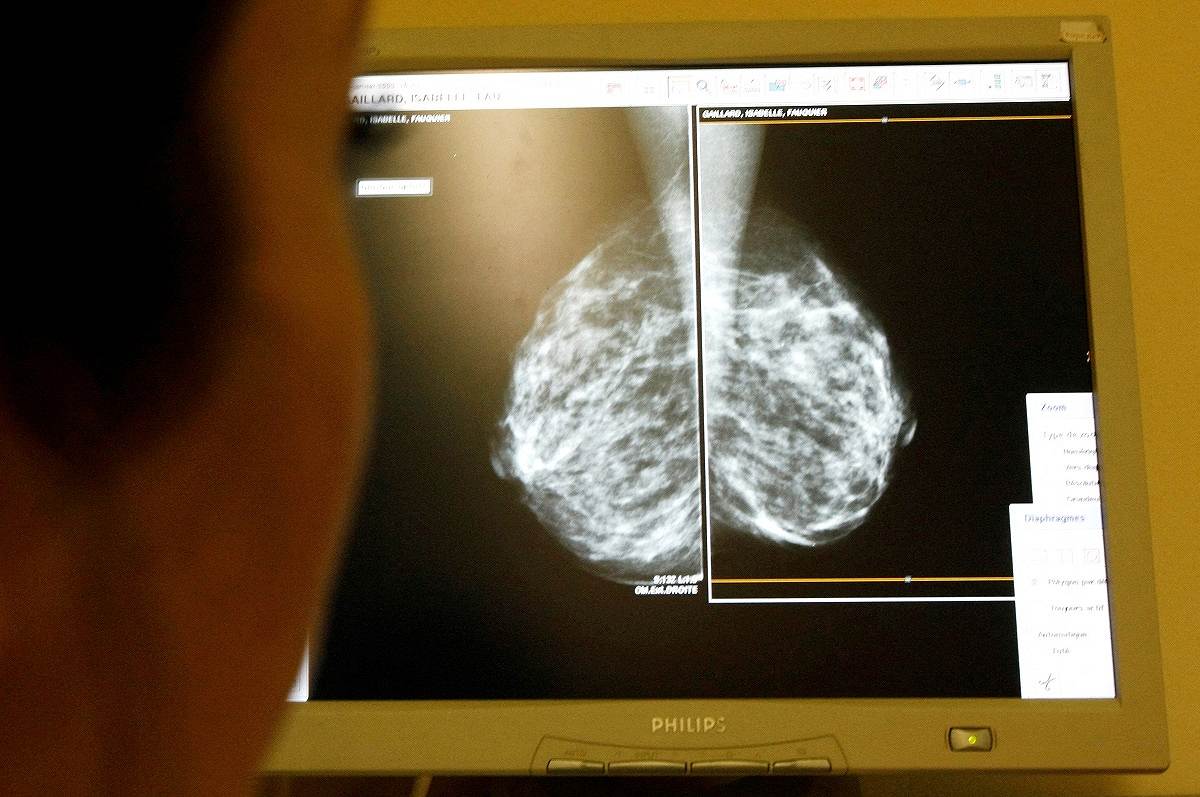
A doctor examines mammograms at a clinic in Nice, France in January 2008.
16:15 JST, May 22, 2024
Twelve breast cancer genes identified in women of African ancestry in a large study published on May 13 may one day help better predict their risk for the disease and highlights potential risk differences from women of European descent.
Studies to identify genetic mutations linked with breast cancer have previously mainly focused on women of European ancestry.
The new findings are drawn from more than 40,000 women of African ancestry in the United States, Africa and Barbados, including 18,034 with breast cancer.
Some of the mutations identified had not previously been linked with the disease, or were not as strongly linked as in this new analysis, indicating that genetic risk factors “may differ between females of African and European ancestry,” the researchers wrote in Nature Genetics.
One newly identified mutation in particular was linked with the disease with a strength “rarely observed” in the field of cancer genetics, the researchers said.
Certain other genes known to increase breast cancer risk in white women were not associated with the disease in this study, the report also noted.
Black women in the United States have higher rates of breast cancer before age 50, a higher incidence of harder-to-treat breast cancers, and a 42% higher breast cancer death rate than white women, according to the American Cancer Society.
Adding the newly identified genes to previously recognized breast cancer genes such as BRCA1 and BRCA2 that are linked with the disease in all populations, the researchers developed a breast cancer risk score for women of African ancestry that was significantly more accurate than currently available tools, they said.
Six of the abnormal genes were associated with an elevated risk for so-called triple-negative breast cancer, the most aggressive form of the disease. Black women have nearly a three-fold increased risk for this type of breast cancer compared to white women, previous research has shown.
Women in the study carrying all six genes were 4.2 times more likely to be diagnosed with triple-negative breast cancer than those with none or only one of the variants, the study found.
The usefulness of the new variants needs to be further evaluated before testing for them becomes routinely available, said study leader Dr. Wei Zheng of Vanderbilt University Medical Center in Nashville.
The American Cancer Society says many genetic mutations previously identified as breast cancer risk factors in white women are also strongly linked with disease risk in Black women, and advises genetic testing for all patients regardless of race.
But U.S. Black women are less likely than white women to undergo breast cancer genetic testing, largely owing to differences in physician recommendations or access to care, the society notes.
Top Articles in Science & Nature
-

Japan Institute to Use Domestic Commercial Optical Lattice Clock to Set Japan Standard Time
-

Japan to Face Shortfall of 3.39 Million Workers in AI, Robotics in 2040; Clerical Workers Seen to Be in Surplus
-

Record 700 Startups to Gather at SusHi Tech Tokyo in April; Event Will Center on Themes Like Artificial Intelligence and Robotics
-

iPS Treatments Pass Key Milestone, but Broader Applications Far from Guaranteed
-

iPS Cell Products for Parkinson’s, Heart Disease OK’d for Commercialization by Japan Health Ministry Panel
JN ACCESS RANKING
-

Japan PM Takaichi’s Cabinet Resigns en Masse
-

Japan Institute to Use Domestic Commercial Optical Lattice Clock to Set Japan Standard Time
-

Israeli Ambassador to Japan Speaks about Japan’s Role in the Reconstruction of Gaza
-

Man Infected with Measles Reportedly Dined at Restaurant in Tokyo Station
-

Videos Plagiarized, Reposted with False Subtitles Claiming ‘Ryukyu Belongs to China’; Anti-China False Information Also Posted in Japan






















